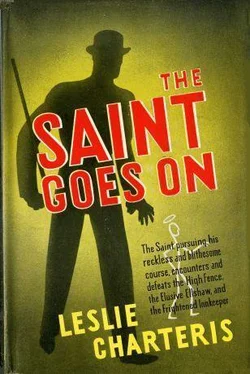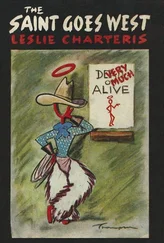"We'll get the Inspector to come round after dinner," said Ripwell affably. "You'll stay, of course."
Teal chewed for a while, pursing his lips.
"I'd rather take your lordship hack to London with me," he said; and Ripwell frowned puzzledly.
"What on earth for?"
"Both the bombing attempts failed, but these people seem pretty determined. They made a second attempt to get Templar a few hours after the first. There's every chance that they may make a second attempt to get you; and it's easier to look after a man in London."
If it is possible for a man to snort good-humouredly, Lord Ripwell achieved the feat.
"Stuff and nonsense, Inspector," he said. "I came down here for a rest and some fresh air. and I'm not going to run away just because of a thing like this. I don't expect we'll hear any more about it; but if we do. I'm in good hands. Anybody who tries to kill me while the Saint's here will be biting off a bit more than he can chew — eh? What d'you say, Templar?"
"I was trying to explain to your lordship," said Teal thickly, "that I only brought Templar down to compare his story with yours. He has no official standing whatever, and as far as I am concerned he can go home—"
"Eh? What? Go home?" said Lord Ripwell, who had suddenly become very obtuse or very determined. "Don't be silly. I'm sure he doesn't want to go home. He likes this sort of thing. It isn't troubling him at all. And I want to talk to him about some of his exploits — I've wanted to for years. I like him. Wish my son was half the man he is." His lordship gurgled with what Mr. Teal, from his prejudiced viewpoint, considered to be positively doddering glee. "You don't want to go home, do you, Templar?"
Simon tapped out a cigarette on his case, and smiled. It was certainly rather a gorgeous situation. His gaze flickered wickedly over Claud Eustace Teal's reddening face.
"All the excitement seems to go on around Lord Ripwell and me," he murmured. "With both of us here together under the same roof, we could look forward to a gay week-end. I think it would be a grand idea to stay."
"Well, what d'you make of it, Templar?" asked Ripwell, when they were scattered about the living-room around a bottle of excellent dry sherry.
Simon shrugged.
"Up to the present, nothing at all. All of you know as much as I do. There seems to be some kind of move afoot to discourage people from seeing Ellshaw; but I've taken a gander at him myself, and I didn't notice anything about him that anyone would be crazy to see. All the same, there must be something big behind it — you don't get three murders planned for the same day because somebody wants to keep the name of his tailor secret."
"Do you think you could ever have known Ellshaw under another name, your lordship?" asked Teal. "Can you think of anyone who might have a bad enough grievance against you to want to blow you up?"
"I haven't an enemy in the world," said Lord Ripwell; and, looking at his clean pleasant face and friendly eyes, the statement was easy to believe.
The Saint grinned slowly, and reached out to refill his glass.
"I have plenty," he remarked. "But if you haven't any, it disposes of that motive. Anyway, it's my experience that your enemies won't take nearly as many risks to kill you as the blokes who just think you might stand in their way. Revenge may be sweet, but boodle buys a hell of a lot more cigars."
"Are we to consider ourselves in a state of siege?" inquired Irelock somewhat ironically.
"Not unless it amuses you," answered the Saint coolly. "But I don't think anyone in this gathering who wants to live to a great age ought to be too casual about standing in front of windows or wandering around the garden after dark. The Ellshaw-hiding outfit keeps moving pretty quickly, by the look of things, and they have enterprising ideas."
Ripwell looked almost hopeful.
"I suppose you've got a gun, Inspector?"
Mr. Teal moved his head in a slow negative gesture, with his jaws working phlegmatically.
"No, I'm not armed," he said tolerantly; and his gaze shifted deliberately on to the Saint, as if estimating the degree of certainty with which he could pick out one man who was.
"I think we have a revolver somewhere," said Irelock.
"By George, so we have!" exclaimed Ripwell. "See if you can find it, Martin."
"There isn't any ammunition," said Irelock cynically.
His lordship's face fell momentarily. Then he recovered buoyantly.
"We'll have to get some — I've got a licence for it. Never thought I should want it, but this is absolutely the time. Where can I get some cartridges? What d'you say, Inspector? With all this business going on, I'm entitled to have a gun in self-defence, what?"
Mr. Teal had the typical English police officer's distaste for firearms, but he had no authority to show his disapproval.
"Certainly, if you have a licence, you're entitled to it," he replied unenthusiastically. "The local police may be able to lend you a few rounds of ammunition."
There was another arrival before dinner in the shape of Lord Ripwell's son, the Honourable Kenneth Nulland, who drove up in a very small and very noisy sports car. Irelock went out to meet him and brought him in — he was a young man with fair wavy hair and a face rather like a bright young cod, and he was very agitated. He shook hands limply.
"Haven't you solved the mystery yet? It's no good asking me to help you. I think it was the jolly old Communists, or the Fascists, or something. Anyhow, I hope they don't try anything more while I'm here — I can only just stay to dinner."
"I thought you were coming down for the week-end," said his father slowly.
"Sorry, Pop. Old Jumbo Ferris rang up and asked me to go to a party — he's having a jolly old beano down at his place in Hampshire."
"Did you have to accept? Cicely's coming over tomorrow." Nulland shook his head. He grabbed a drink and hung himself over a chair, rather like a languid eel in plus fours. "Sorry, Pop. But she won't miss me."
"I don't blame her," said Ripwell. with devastating candour. He turned to Teal and the Saint. "Cicely Holland's a sort of protegee of mine. Works in my office. Daughter of a pal of mine when I was young. Never made any money, but he was a pal till he died. Damned fine girl. I wish Kenneth was fit to marry her. She won't look at him as he is, and I wouldn't either."
Kenneth Nulland grinned weakly. "Pop thinks I'm a jolly old prodigal son," he explained. The explanation was scarcely necessary. Simon sensed the bitter disappointment behind Lord Ripwell's vigorous frankness, and, for his own comfort, led the conversation away into a less personal channel. But while he went on casually talking he studied Lord Ripwell's heir-presumptive more closely, and realised that Nulland was simultaneously studying him. The youngster was a mass of undisciplined nerves under his flaccid posturing, and the inane cliches which made up ninety per cent, of his dialogue came pattering out so noisily at the slightest lull in the general talk that Simon wondered why he was so afraid of silence.
Teal noticed it too.
"What do you think?" he asked the Saint.
They were alone together for a moment after dinner — Lord Ripwell was telephoning the local Inspector, and Nulland had taken Martin Irelock out to admire some new gadget he had had fitted to his car.
"He's frightened," said the Saint carefully. "But I don't know that it would take much to frighten him. Maybe he doesn't want to be blown up."
Mr. Teal sucked at his after-dinner ration of spearmint. He was letting himself become temporarily resigned to the irregularity of his position. After all, there was nothing else that he could do about it. The house was Lord Ripwell's, and the case was more or less Lord Ripwell's: if Lord Ripwell wanted the Saint to stay with him, that was Lord Ripwell's business and nobody else's. Even the Assistant Commissioner, Teal tried to tell himself with more confidence than he actually felt, could have found no flaw in the transparent logic of the argument. Therefore, proceeded Chief Inspector Teal, brilliantly scoring all the points in this pleasant imaginary debate with the spectre of his superior officer, since the Saint had to be accepted, it was simply an obvious stroke of masterly and unscrupulous cunning to pick his brains for any help they could be induced to yield.
Читать дальше












